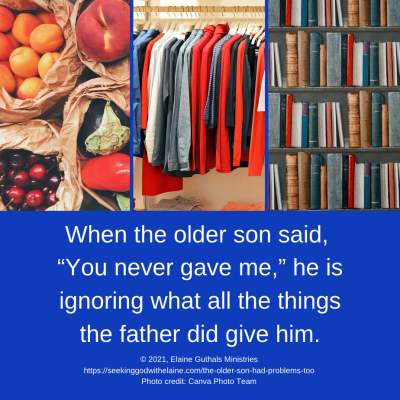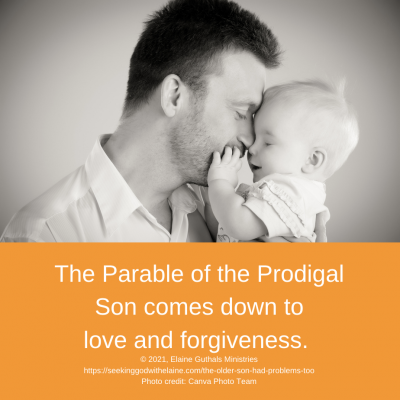The final devotion in the Parable of the Prodigal Son series looks at the older brother. Though he may have remained working with his father, he had his own issues. This daily devotional looks at his response and the father’s response to the return of the prodigal son.
Nuggets
- We, unlike the older son, should use the Sanctification Road to change our character to be like God’s.
- We, unlike the older son, should put our emphasis on loving the Father and doing His Will.
- We, unlike the older son, should put God’s family first.
- We, unlike the older son, should accept that God is in control.
Devotions in the Luke’s Diagnosis and Prescription series
To read a devotion in the Parable of the Prodigal Son series, click the appropriate button below.

It might be easy to think the prodigal son’s older brother is the poster child of what we should do. But if we look beneath the surface, we find out he really has a problem, too.
Still, I love the reasoning Mellor gave as to why the older son’s position should be preferred.
- The older son hadn’t abandoned the father, so he did not need to come back. There was no guarantee that the prodigal son would repent.
- We should be striving for godliness. It is harder when we slide backwards on the Sanctification Road than it is if we go full steam ahead.
- The older son’s joy — and his father’s joy of him — was not broken.
Resource
What does this boil down to? God wants us to be obedient. He wants us navigating the Sanctification Road in order to change our character to be like His.
God will forgive us when we are not obedient, but He will always prefer obedience over disobedience.
Let’s Put It into Context #1
Previous nuggets are
- We, like the prodigal son, turn away from God.
- We, like the prodigal son, are far from God when we allow sin to rule our lives.
- We, like the prodigal son have to face the consequences of our choices.
- We, like the prodigal son, have to repent.
- We, like the prodigal son, have to return to God, and He will meet us.
- We, like the prodigal son, have to say the words that shows we repent.
- We, like the prodigal son, will be forgiven by God when we sincerely repent.
Let’s Put It into Context #2
We talked in the first devotion that, even though the audience was mainly scribes and Pharisees, the prodigal son was meant for the publicans and sinners in the crowd. Thomson thought the older son was depicted the scribes and Pharisees.
Resource
Think about it. When Gentiles started being converted, what was the reaction of the scribes and Pharisees? They puffed out their chests, stuck their noses up in the air — and threw a hissy fit.
Jesus wasn’t telling this parable just to tell people that they needed to mend their sinful ways. He was telling people that we have to accept those who have chosen to accept Him as their Savior and be a real family.
One of the points of the parable is that we are not superior to anyone else. The Pharisees sure felt that way!
The Older Son Didn’t Have God’s Character
“Now his older son was in the field; as he came near the house, he heard music and dancing. So he summoned one of the servants, questioning what these things meant. ‘Your brother is here,’ he told him, ‘and your father has slaughtered the fattened calf because he has him back safe and sound.’ Then he became angry and didn’t want to go in. So his father came out and pleaded with him. But he replied to his father, ‘Look, I have been slaving many years for you, and I have never disobeyed your orders, yet you never gave me a goat so that I could celebrate with my friends. But when this son of yours came, who has devoured your assets with prostitutes, you slaughtered the fattened calf for him’” (Lk. 15: 25-30 CSB)
We, unlike the older son, should use the Sanctification Road to change our character to be like God’s.
We get on the surface that the older son doesn’t want to welcome the sinner back home. Do you think the older brother unadopted the prodigal son? “But when this son of yours came …” (Lk. 15: 30 CSB emphasis added). Tell us how you really feel, bro!!!
God says, wrong, wrong, wrong! Everyone who genuinely repents is forgiven.
But when we look under the surface, we see that the older son wasn’t squeaky clean, either. He puffed out his chest, stuck his nose up in the air — and threw a hissy fit.
Mellor made a great point. Jesus had to introduce us to the older son in the parable to showcase how loving the Father is. It is easy to love the obedient. It takes the Father’s heart to love the rebellious.
Mellor called the older son a “… narrow good man …” Ouch! I wonder how many of today’s disciples that description would fit? Isn’t that what the worldview people accuse us of being?
Resource
We can’t be narrow minded. But neither can we adopt the worldview’s broad way of thinking. We have to adopt God’s way of thinking.
More importantly, we need to have God’s character. The older son had some issues there.
The older son may not have abandoned his father, but ooo, baby, did jealousy have the hook in him!
Can’t you just see him? Stomping his feet. Waiving his arms. Screaming, “I’ve been the faithful one!!!”
The older son was being selfish. That isn’t a character trait that God wants us to have.
All the older son wanted was the opportunity to have a feast with his friends. Yet, he doesn’t show mercy to his brother.
What may be considered the root of all of this is the older son’s anger. The older son was angry because the prodigal son ABCDed.
Man, did the older son miss the boat!
God is never angry when we turn to Him. That is the whole reason He sent Jesus to be our Savior. He wanted our relationships with Him restored.
What the older son got out of it was being cut off from God’s joy. He wouldn’t go into the party and join in the dancing. He wasn’t joining in the celebration.

The Older Son Didn’t Love
We, unlike the older son, should put our emphasis on loving the Father and doing His Will.
We said the prodigal son didn’t show any love for his father. Neither did the older son. It sounds like everything the older son did was because of duty, not for love of the father.
Gatty came down hard on older son. He felt that his response now put into question the motivation behind his obedience and hard work. Was he doing them because he loved his father and this was what was right or because he wanted the reward?
Resource
Part of the older son’s problem was he thought it was all about what he did or didn’t do. Verse 29 says what he did was worked hard. What it says he didn’t do was disobey his father.
That’s what he — and we — are supposed to do, right? Get the do the do’s and don’t do the don’ts down pat.
Not exclusively.
We can’t work our way into salvation. “For by grace you have been saved through faith. And this is not your own doing; it is the gift of God, not a result of works, so that no one may boast” (Eph. 2: 8-9 ESV).
The problem with the older son latching onto the Do and Don’t Theory is it increased his feelings of self-importance. It was about him, not about serving his father.
Another thing the older son was doing was expecting his rewards here on earth. He was saying, “Where is my fatted calf? I deserve a reward for being faithful.”
True, God will reward us here. The best rewards, however, are going to be saved for Heaven.
God gives us so much. He gives us life and health. He provides what we need.
“Therefore I tell you, do not be anxious about your life, what you will eat or what you will drink, nor about your body, what you will put on. Is not life more than food, and the body more than clothing?” (Mt. 6: 25 ESV).
When the older son said, “You never gave me,” he is ignoring what all the things the father did give him. He isn’t looking at his father in the correct way.

The Older Son Was Not Family Oriented
We, unlike the older son, should put God’s family first.
God really wants family first. “For this reason I bow my knees before the Father, from whom every family in heaven and on earth is named” (Eph. 3: 14-15 ESV).
Robertson said this is how the church is defined — it is a family. We are to love the different members of the family. A major theme of Ephesians is unity of the body.
Resource
It comes down to love and forgiveness. That was the point of Jesus’ parable.

The Father Sets Things Straight
“‘Son,’ he said to him, ‘you are always with me, and everything I have is yours. But we had to celebrate and rejoice, because this brother of yours was dead and is alive again; he was lost and is found’” (Lk. 15: 31-32 CSB)
We, unlike the older son, should accept that God is in control.
God’s priority has been and will always be our salvation.
- Salvation is deliverance from evil and the consequences of sins to replace them with good and eternal life.
- The consequences of sin are spiritual death and separation from God.
- Spiritual death is the separation from God that occurred as a consequence of Adam and Eve’s original sin. The spiritually alive are those who have ABCDed, so they are no longer separated from God.
- Eternal life is the promise of living eternally – even if we have died in this life – because we have admitted our sins, believed Jesus as Savior and Redeemer, and confessed God as Sovereign Lord.
Romans 2: 11 says that God shows no favoritism. Robertson argue that, “God has a right to do what he will.“ If he wants to show favoritism, that is what it is right.
The first reason, according to Robertson, that this was the right action by God was that it was in celebration of a person’s salvation. That is reason to celebrate.
The second reason that Robertson offered was that the older son had a lifetime of peace. The continued presence of God in our lives is better than our disobedience and forgiveness.
Resource
I am just over here struggling with whether the party was a sign of favoritism or a reward for obedience. Rewarding obedience is not showing favoritism.
Newman makes a good point. If the older son was expecting more evidence from the prodigal son that his repentance was genuine, that is not the way God works. He does not make us change before salvation. God accepts us as we are and begins our journey on the Sanctification Road to make the needed changes to our character.
Resource
If God would only except our request for salvation after we cleaned up our acts, that would be salvation by works, not faith and grace. God doesn’t work that way.
Look at it this way. Isn’t this saying that we should be so confident and content in our faith that we don’t need the parties and celebrations to be reminded that God is present?
Oh, that convicts me. How many times have I all but screamed at the ceiling, “God, where are you? You haven’t done anything for me lately.“
Don’t I know God is always here? He promised that.

It is better to obey God than not obey Him. Even disciples are going to have trouble obeying Him.
God loves us anyway when we truly love Him.
We have to remember that God’s purpose is to expand His kingdom. That means bringing repentant sinners into the fold. We should rejoice when He accomplishes His purpose.

Making the Connections
We are going to chase a rabbit a second. Jortin made an interesting statement that I haven’t decided if it is comforting or not. He wrote, “Nothing is so hard as to overcome old vices, and to root up evil habits; for by custom they have taken firm hold, just like chronical diseases, which are seldom cured. From such grievous inconveniences he is freed who hath been accustomed to regular obedience.”
Resource
Most, if not all, of us struggle with that one sin that we have trouble giving up. We may think we’ve mastered it for a while — then, here it comes again.
Jortin’s point was that the older son was freed from this struggle because he had regularly been obedient.
How Do We Apply This?
So, we disciples have to ask ourselves this question: how much elder brotherliness (Taylor) and Pharisaism (Dods) do we have in us? Dods reminded us that “… it is not service that wins God’s love; that His love is with you now, and that your acceptance of it will make all that has seemed to you grievous to be light and happy.”
Resource
- We have to come to God voluntarily. He will never force us.
- We have to do things God’s way — obedience and repentance.
- We have to come to God as we are — wearing rags, dehydrated, starving, emaciated, and barefooted.
- We have to eliminate the self-righteousness.
- We have to be the family God wants us to be.
Resource
Jortin wrote, “A regular obedience makes us more truly and properly the children of God.” That should be our goal — to truly and properly be the children of God.
Resource
Glossary
We do that by ABCDing and seeking God.
The ABCDs of Salvation
If you have not become a believer in Christ, please read through the
Plan of Salvation and prayerfully consider what God is asking you to do.
A – admit our sins
B – believe His Son Jesus is our Redeemer
C – confess God as Sovereign Lord
D – demonstrate that commitment by making any changes needed in our lives to
live the way in which God has called us
The Disciple’s Job Description
Searching for and Seeking God
Hearing His Word (Rom. 10: 17).
Reading His Word (Rev. 1: 3).
Praying to Him (Heb. 4: 16).
Studying His Word (Ac. 17: 11).
Meditating on His Word (Ps. 1: 1-2).
Memorizing His Word (Ps. 119: 11).
We do it by humbly submitting our lives to Him.
Father God. You are always near Your children. We want to be Your children. Help us to be content in that promise. Amen.
What do you think?
Leave me a comment below (about this or anything else) or head over to my Facebook group for some interactive discussion.
If you don’t understand something and would like further clarification, please contact me.
If you have not signed up for the email daily or weekly providing the link to the devotions and the newsletter, do so below.
If God has used this devotion to speak with you, consider sharing it on social media.
Pingback: Why Salvation Came to a Man in a Tree – Seeking God with Elaine
Pingback: John the Baptist’s Tough Message – Seeking God with Elaine
Pingback: Focusing Our Labor on God – Seeking God with Elaine